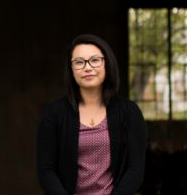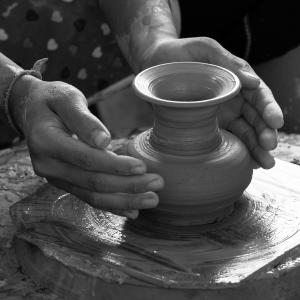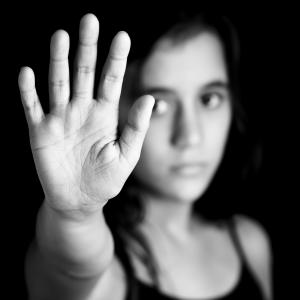
Mihee Kim-Kort is co-pastor with her spouse of First Presbyterian Church in Annapolis, Md. She is author of Making Paper Cranes (2012) and Outside the Lines(2018), editor of Streams Run Uphill(2014), and coauthor of Yoked (2016). She is currently a Ph.D. candidate in religious studies at Indiana University (Bloomington).
Posts By This Author
Led Out in Joy, with Rainbow Cookies and Fresca
“To live fully and authentically.” It’s a phrase that resonates for me as someone who came into their queerness later in life. For a long time, the possibility of living fully and authentically felt just beyond my reach; I felt I was skimming the surface of my being and longed to be fully immersed — soaked and drenched — in who I am. But I was afraid. What would living authentically mean for my place in the world? As a second-generation Korean American who has long struggled to be seen and accepted, I wondered if being queer would foreclose this possibility.
What Do Politicians Mean When They Invoke Matthew 25?
Matthew 25 isn’t meant to be a warm and fuzzy, feel-good passage.
Missionaries, Asylum Seekers, and the Inconsistency of Borders
Last week, the world was introduced to John Allen Chau, the U.S. American “adventurer” and missionary who was killed by an indigenous group on North Sentinel Island. According to a statement from missionary organization All Nations, Chau was a “seasoned traveler who was well-versed in cross-cultural issues” and had “previously taken part in missions projects in Iraq, Kurdistan and South Africa.” Now, Indian police have begun the dangerous mission of trying to recover the body even though a tribal rights group has urged officials to call off the search, claiming it puts them and the indigenous group in danger.
Food Apartheid: The Sustainability of Racial Discrimination
The focus of [Jas Singh]'s farm is not production, but invitation — to allow all manner of flesh-and-blood to participate in the mysterious and divine but simple work of God’s kingdom — one where everyone who is fed, and those who typically don’t have the means to provide actually find they have an abundant harvest to share with their neighbor. It is a way to radically engage in leveling the field for all to give, receive, and partake in a way that doesn’t match our unjust economic structures.
This Is My Body
What do our bodies—dreadlocks, muscles, thighs, and all—teach us about God?
ON DEC. 10, 2015, shortly after then-candidate Donald Trump suggested a “total and complete shutdown” of Muslim immigration, Wheaton College professor Larycia Hawkins wrapped a hijab around her head, snapped a selfie, and posted the photo on Facebook. “I stand in religious solidarity with Muslims because they, like me, a Christian, are people of the book,” wrote Hawkins in the post. “And as Pope Francis stated last week, we worship the same God.”
It was a costly act for Hawkins: Three months later, following a controversy about whether she had violated the evangelical school’s statement of faith, she was no longer a tenured professor at Wheaton. But Hawkins doesn’t regret what she did. As she sees it, true solidarity—she calls it “embodied solidarity”—always comes with a cost.
When it comes to bodies and the church, Christians often start with St. Augustine. Though the esteemed fourth century bishop of Hippo spent a full decade debunking the dualistic heresy that material bodies were evil, he remained famously skittish about fleshy influence on the soul. By Augustine’s reading of scripture, bodies weren’t inherently wicked, but they sure were weak—especially female bodies—and you had to watch ’em or God-only-knows what kind of sinful depravity might creep in. He often quoted the Book of Wisdom: “the corruptible body weighs down the soul and the earthly tabernacle presses down the mind that muses upon many things.” And you don’t have to be a church-history expert to trace the devastating legitimacy Augustine’s ideas gave to misogyny and other forms of body-based oppression in Christianity.
Yet as Christians in every generation have countered, we can’t write bodies off so easily. After all, smack dab in the middle of our confession of faith is a savior who suffered bodily, was crucified, and rose again. What’s more, this same savior was known for saying that love is laying down your life, and how we treat others is ultimately how we treat God. “‘Suffering with’ requires our entire bodies,” Hawkins later explained. “Suffering from a distance is not solidarity. Theoretical solidarity is not solidarity at all.”
Sojourners asked six Christian writers and theologians: What does your body tell you about God? Not bodies in the abstract, but your body: pimples, dreadlocks, muscles, belly buttons, wrinkles, thighs, and all. And though it might sound like an exercise in navel- gazing sure to make Augustine roll over in his grave, the responses we received say a lot about the carne part of incarnation: the radical solidarity of a God who took on flesh. - The Editors
Making All Others' Work Possible
We have lost touch with the deep significance of work by separating the dignity, creativity, and livelihood of work from the individual person. In today’s emphasis on consumer capitalism — results and products — we have forgotten the interconnectedness of all our work, and the way we are baptized into the human community and live out that baptism through participating in purposeful work with our hands and feet.
After Tragedy, How Do We Trust God's Power?

Image via santol/Shutterstock.com
A major tenet of Protestant faith is the act of confession, both as individuals and as a community. Confession can serve as a means to honestly and genuinely express not only one’s failures, or the failures of a community, but to acknowledge and lament the fragility of humanity. What would it mean for our churches to say to our neighbors that we are wholly and painfully aware of the ways in which those who profess to follow the Christian faith have failed over and over in not only the areas of tolerance but compassion? That we do lip service but when it comes to truly knowing and loving our neighbors, we have so much more work in front of us?
Guns, Drugs, Sexual Violence: What Can We Do?

Image via Kamira / Shutterstock
The emotional, physical, and spiritual violence that we inflict on one other is a sign that something is amiss in our world. A study from the World Health Organization paints the terrible truth that sex workers have a heightened risk of HIV. The sex and drug industry “tear up women and use them ‘til they throw them out" as Rev. Rebecca Stevens, Executive Director of Magdalene Ministries, says. Magdalene is a recovery program in Nashville, Tenn. for women who have histories of substance abuse and prostitution. Stevens has helped countless women get off the streets and put their lives back together. Yet there are so many more in need. It is clear that something is persistently bent on the annihilation of our bodies and souls. What can we say or do?





